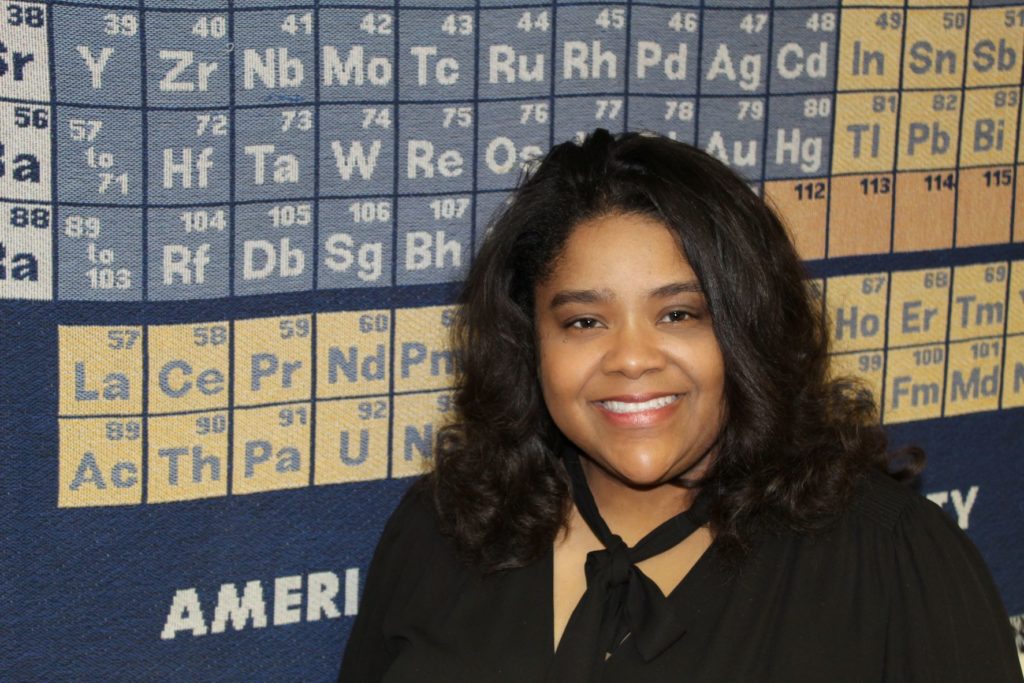
UMES’ Department of Natural Sciences will host distinguished chemist Dr. Kimberly Jackson as the speaker for an April 14 scientific lecture for the campus community and a non-scientific talk open to the public the following day, both in the Richard A. Henson Center. Jackson is chair and professor of chemistry and biochemistry at Spelman College in Atlanta and received recognition as one of the “Twenty-two Trailblazing Black Scientists and Engineers” last year by Chemical and Engineering News.
The events are funded through the School of Agricultural and Natural Sciences lecture series and a 2021 Jean Dreyfus Lectureship for Undergraduate Institutions awarded by the Camille and Henry Dreyfus Foundation. Jackson will speak to the STEM community on campus about “Securing a Space for Black Women Scientists Through Agency, Empowerment and Cancer Therapeutics.” The 4 p.m. presentation will encompass her career accomplishments as both a mentor and researcher.
On April 15 at 10 a.m., Jackson will address a non-scientific audience on the topic, “Communicating Chemistry Through the Local Cuisine and Beyond.” A reception follows both events. Both events are free, however registration is required. Register for the April 14 (technical talk) at https://sansdreyfuslecturetechnical.eventbrite.com and for the April 15 (open to the public) talk at https://sansdreyfuslecturepublic.eventbrite.com. Jackson will also take part in informal meetings on campus with students and faculty.
“We are thrilled that UMES was the only HBCU to be awarded a Jean Dreyfus Lectureship for Undergraduate Institutions this year and are delighted that Dr. Jackson has accepted our invitation,” said Dr. Deborah Sauder a chemistry professor who was awarded the grant and arranged the visit. “Her willingness to share her expertise as a mentor to minority students in STEM will benefit both our faculty and undergraduate students. Her research on novel therapeutics for cancer treatment will be of interest to undergraduate and graduate students, along with faculty in areas such as chemistry, biochemistry, toxicology, food science, dietetics, agriculture and the health professions—in short, it spans a broad swath of the academic interests at the university.”
Jackson, a Fulbright Scholar, “maintains robust and active research programs focused on novel therapeutic agents (plant-based) for castration-resistant prostate cancer.” She holds a research fellow position at the Marine Biological Laboratory in Woods Hole, Massachusetts, and a visiting faculty appointment in systems biology at Harvard Medical School in Boston.
In addition to scholarly and research pursuits, Jackson is also founder and co-director of the LINCS Scholars program, a learning community for STEM scholars and initiative to improve access to STEM research careers for women of color “through professional and social networks and social justice empowerment.” She serves on various advisory boards in order to implement policies that promote best practices for recruitment, retention and career development of minority students.
The $18,500 Dreyfus award will also fund an opportunity for two UMES students to pursue chemistry research at the university this summer. The internships will be awarded following a competitive application process, Sauder said. Interns will receive a $4,500 stipend along with a $1,000 award to defray the costs of attending a meeting the following fall to present the results of their research. They will also benefit from professional development support in collaboration with other summer research programs offered through UMES’ Department of Natural Sciences.
“Undergraduate research experiences have been shown to support students in completing undergraduate STEM programs. The opportunities for hands-on experiences and the ability to share their results and learn about other research projects underway by their colleagues can really broaden a student’s understanding of what scientific research really is and how it drives the development of new understanding of our world and our role in it,” Sauder said.
The Department of Natural Sciences is appreciative of the confidence the Jean Dreyfus Foundation has shown in supporting its chemistry and biochemistry programs through their generous grant, Sauder added. “We hope members of the university community and the public will take advantage of this opportunity to hear Dr. Jackson discuss issues that are not only of professional interest to her, but also dear to her heart and to many of us in the academic community.”
Gail Stephens, agricultural communications, University of Maryland Eastern Shore, School of Agricultural and Natural Sciences, gcstephens@umes.edu, 410-621-3850.

